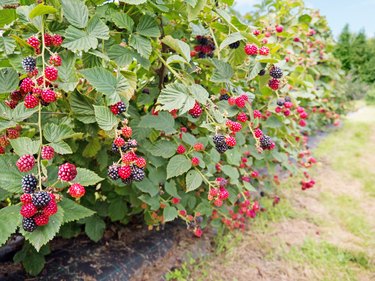
Raspberries are a versatile fruit that grows on bushes that can be planted for their fruit-bearing abilities and to create an attractive natural fence. Applying mulch to the raspberry bush gardening area can serve a number of different purposes -- the right mulch can enhance soil as well as cut down on the appearance of weeds. Not all mulches are created equal, however, and some unconventional choices may work well around raspberry bushes.
Types of Mulch Suitable for Raspberries
Video of the Day
There are a variety of materials that can be used for mulching fruits and vegetables, but some materials work better for raspberry bushes than others. Grass clippings can be spread along the bottoms of the bushes, and these cuttings will decay quickly and return nutrients to the soil. Other yard waste such as fallen leaves can be used in a similar way. Wood products such as sawdust, wood chips and small cuttings can also be efficient types of mulch.
Video of the Day
Benefits of Mulching Raspberry Plants
Using yard waste such as grass cuttings and leaves to mulch around raspberry bushes has a number of benefits. Raspberry bushes bear their fruit above ground level, so unlike many vegetables, the fruits will not be negatively impacted by sitting on a heavy, complete ground cover of mulch. A thorough covering of leaves and grass cuttings will create a blanket over the ground, which will keep moisture from evaporating from the soil during dry spells.
While the crops of other vegetables might rot if exposed to the consistently moist mulch, raspberries will benefit from the consistent moisture. The thorough blanket will also keep weeds from growing around the plants. Unlike other types of mulch, such as cereal grain crops, yard and wood waste typically has no plant seeds in it that will take root and need to be weeded out later.
Mulching Raspberries for Winter
The same materials can be used to protect root systems through the winter months. Raspberry plants can successfully winter through many areas, as long as they are allowed to lie close to the ground or have some sort of support structure and shelter that protects them from the elements. While it is usually not necessary to add more layers onto the top of the plants, leaves and grass cuttings, as well as wood shavings, will decompose slowly over the winter months. Often, the mulch will disappear completely, requiring a fresh application in the spring. This also acts as a fertilizer, returning nutrient content to the soil and changing it into a form usable by the bushes as they begin their growth cycle.
Take Care When Mulching Raspberry Plants
When using yard waste like grass and fallen leaves, be sure the materials that are being applied to the raspberries are disease- and pest-free. Raspberries are susceptible to damage from insects, so making sure the mulch is from a clean source will prevent insects from being introduced through mulch. Termites and insect eggs can hide in wood, so examining the shavings for signs of holes and infestation is key. Leaves can also carry insect eggs and infestation, so it is crucial not to use leaves that have fallen prematurely or come from trees that have unusual coloration, as this can suggest a disease.
- Ohio State University Extension Fact Sheet; Raspberries for the Backyard Fruit Planting; Gary Gao
- Oregon State University Extension: Growing Raspberries in Your Home Garden
- Iowa State University Extension; Organic Mulches; Richard Jauron; 2005
- University of Minnesota Extension; Raspberries for the Home Garden; Emily E. Hoover; 2008